Earned links are the holy grail of SEO.
You don’t pay for them and you don’t ask for them, but they happen naturally as a result of good content and user experience.
So, do you want to know how to earn those links?
Here’s the step-by-step process.
Contents:
What Are Earned Links?
Earned links, also known as natural or editorial links, are those that come from other websites without any request or incentive.
In other words, they are the digital votes of confidence that signal to search engines the quality of your content and website.
Now, I know what you’re thinking.
How do I know what makes a good link?
According to Google’s John Mueller:
A good link… so I mean the traditional good link is someone who comes across your website and thinks it’s a fantastic website and recommends it to other people with a link.

Earned Links and SEO
Search engines use earned links as one of their ranking factors for determining the importance and relevance of websites.
As a general rule, the more high-quality and natural links your website has, the more likely it is to rank higher in SERPs.
Moreover, if people find that authoritative websites are linking to yours, they are more likely to trust your content and become regular visitors.
Plus, these links do not violate Google’s spam policies.
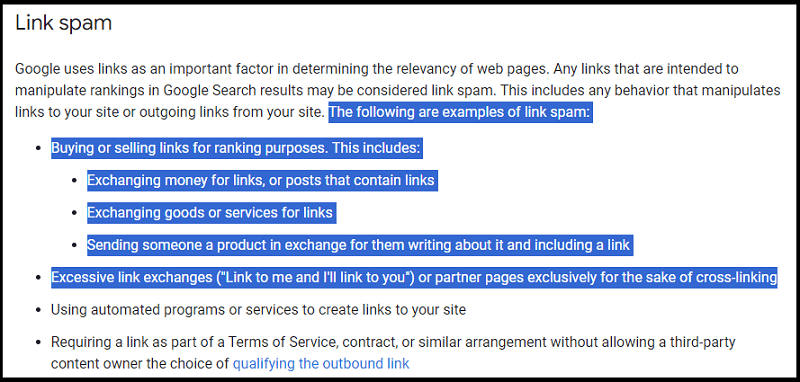
So, what are the benefits of earned links?
- Increased organic traffic. As your website gains more of these links, it improves its reputation and authority, leading to higher rankings and increased organic visitors.
- Improved brand visibility. When your content is shared through natural links on reputable websites, it exposes your brand to a wider audience, increasing brand recognition and trust.
- Higher conversion rates. Since these backlinks come from websites that are relevant to your niche, they attract more targeted users with a higher chance of converting into customers.
Link Building VS Link Earning
Link building and link earning are two common strategies for acquiring backlinks.
But what is the difference between them?
Link building involves actively reaching out to websites and requesting links, usually through methods like guest blogging, link exchange, or outreach.
On the other hand, link earning focuses on creating high-quality content that naturally attracts backlinks from other site owners.
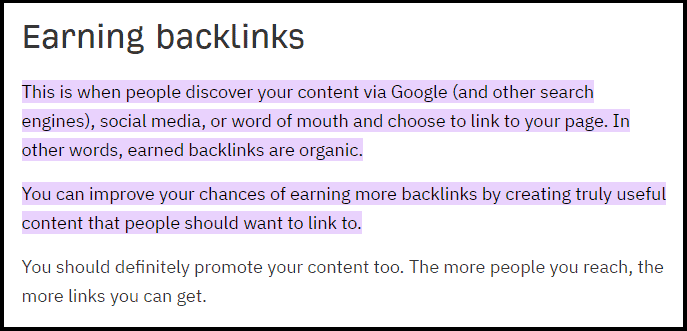
While both strategies have their own benefits, earned links are generally considered more valuable and sustainable in the long run.
In fact, they are:
- Safe
- Cheaper than paid links
- Better in Google’s eyes
Safe
Earned links are immune to Google penalties since they are natural and not obtained through manipulative techniques.
This means that your website is less likely to be affected by algorithm updates, protecting your marketing efforts.
Cheaper than paid links
Link-building strategies often involve some form of payment, whether it’s time or money spent on guest posts or buying backlinks.
On the other hand, link earning is a more cost-effective approach since the only investment required is in creating valuable content.
Better in Google’s eyes
Over time, Google has become more effective in detecting and penalizing unnatural links.
So, using manipulative techniques to acquire backlinks can do more harm than good for your website’s rankings.
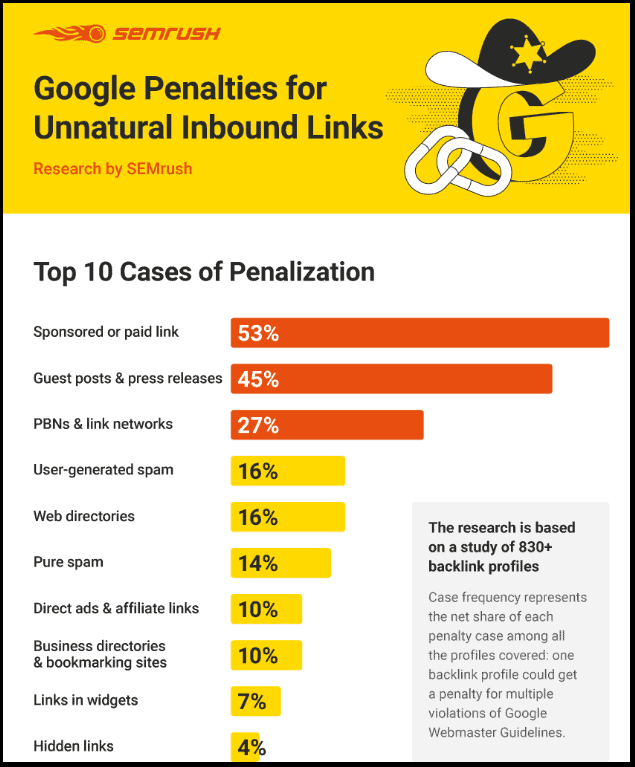
In contrast, earned links show Google that users naturally find value in your content, making them a safer and preferred option.
Examples of Earned Links
Are you wondering what natural links look like?
Here are some examples:
- If you publish a high-quality blog post, it may get shared by other bloggers or cited in their articles, resulting in natural backlinks
- A customer shares your product page on their social media accounts with a link to your website
- A journalist finds your website interesting and decides to reference it in their article, linking back to your content
Based on my experience, here are three of my best-earned links.
Example #1 – MOZ
A Moz author mentioned my “featured snippets” guide and linked back from his article about “A Timeline of Bing and Bard Features“:
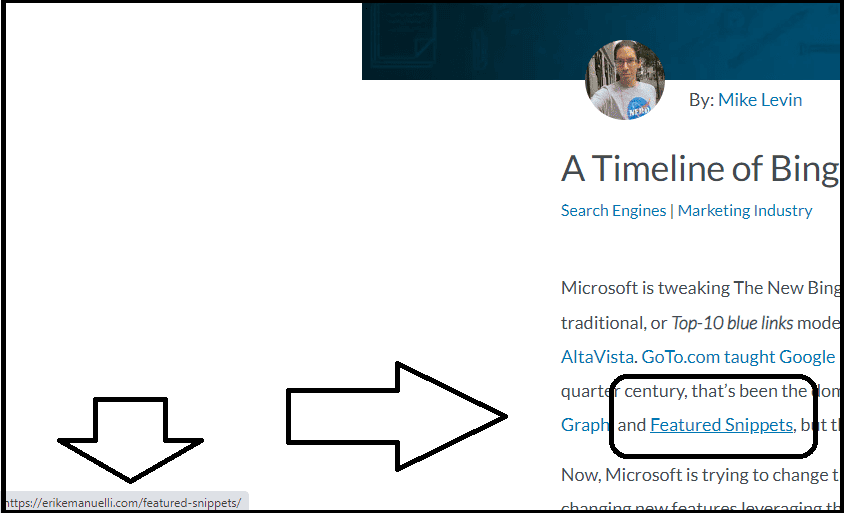
Example #2 – Ahrefs
An Ahrefs content writer wrote about “SEO copywriting” and included a link to my “bucket brigades” post suggesting to check for more bucket brigade words.
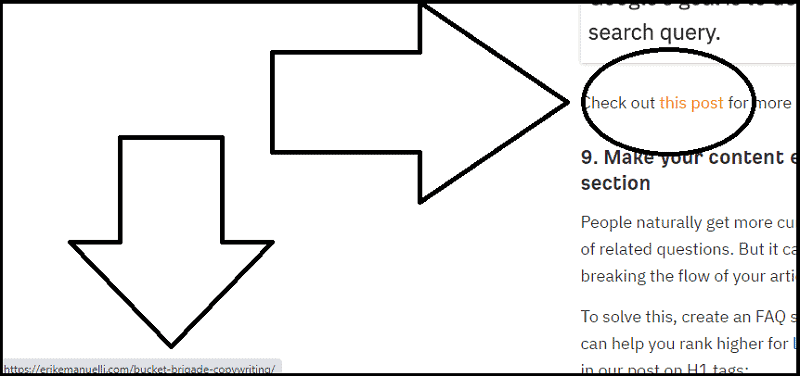
Example #3 – Search Engine Watch
A Search Engine Watch author listed the nine fundamental content marketing myths and referred to the analysis section of my keyword research guide.
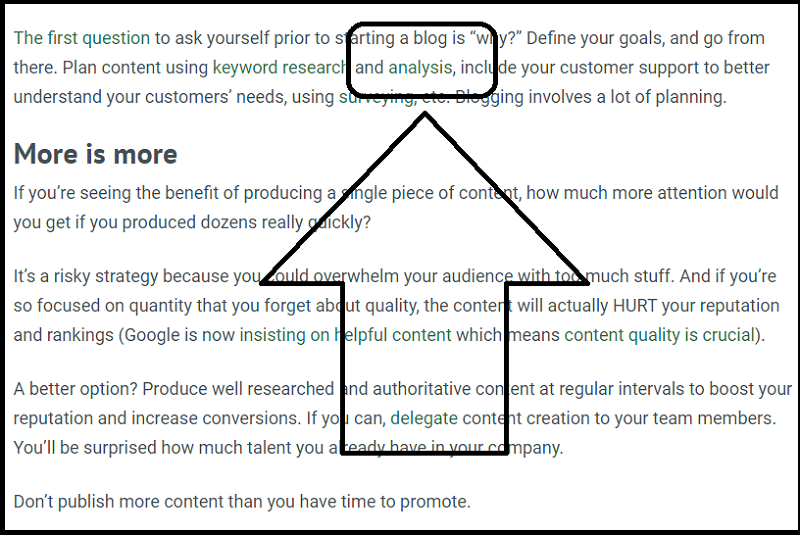
As you can see, these three examples have something in common:
- They are natural links, earned through valuable content
- They come from reputable websites in the same niche as mine, increasing my website’s authority and relevance
- They were not obtained through paid methods or link exchange, making them more valuable in Google’s eyes.
4 Steps to Earn Links Naturally
In its Search Essentials, Google listed the key best practices to improve content’s ranking and appearance on search engines.
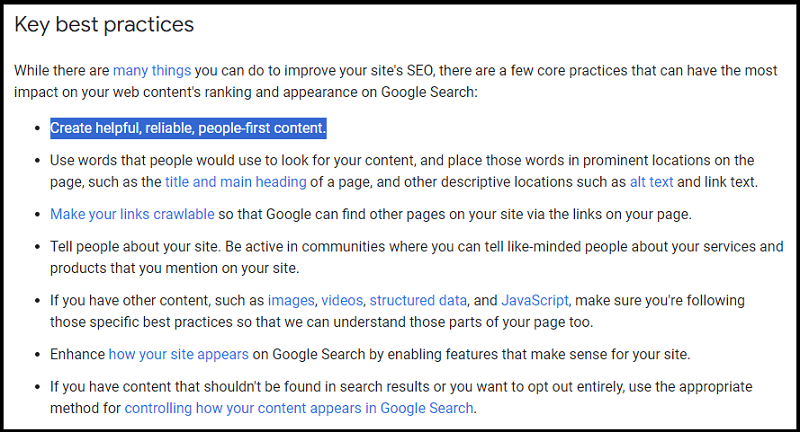
Based on its recommendations and on my experience, here is the step-by-step process to earn links naturally:
1. Keyword Research
Before creating content, research the keywords to target and go for those with a good search volume and low competition.
Other than covering topics that a few have written about, this will increase the chances of your content ranking well on Google and attracting more organic traffic.
For example, I found the term “SEO without link building” while browsing through the keywords I was ranking for with Ahrefs:

At that time, it was showing a low keyword difficulty (just “8”, which means easy to rank for):
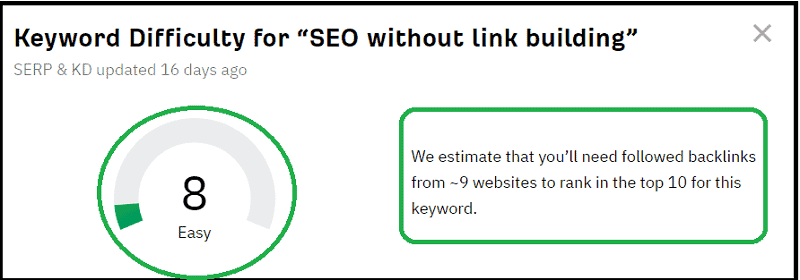
So, I created a great article around it, which made me earn the first position in search results, including being featured in the People Also Ask section:
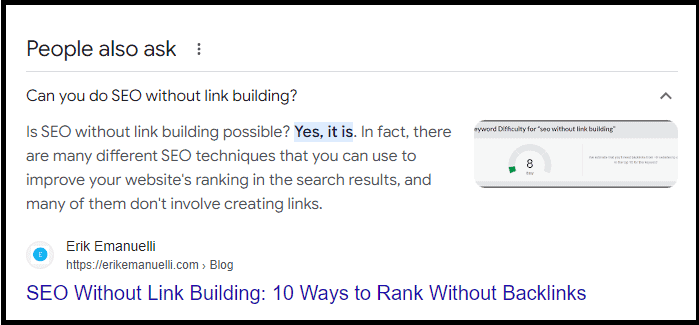
And the good news?
This content has been linked naturally by BuzzSumo in one of their blog posts (to the “parasite SEO” section):
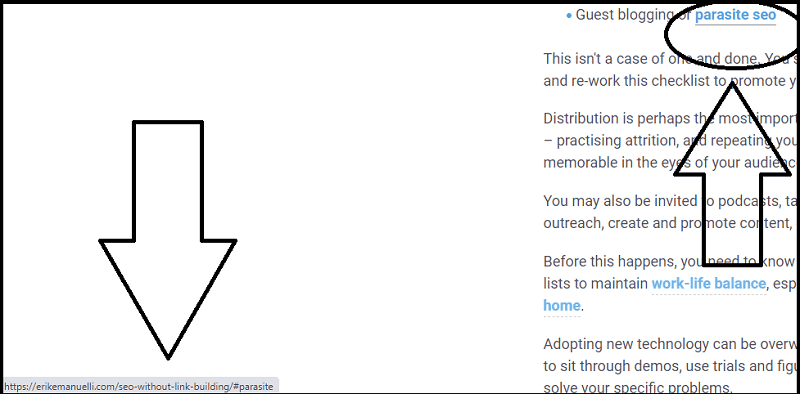
So, how can you find golden opportunities?
In Ahrefs (even in the free version, with your verified property), visit the organic keywords you are ranking for, filter per difficulty, and browse to find terms you haven’t targeted.
For example, with a quick research, I found the term “one-way link building”:
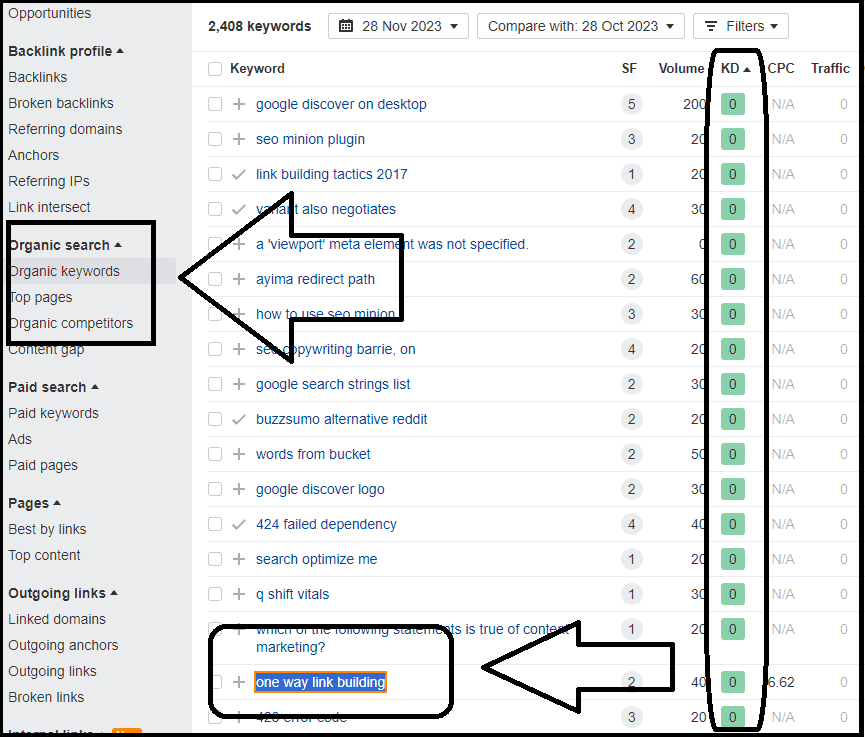
Or, you may want to analyze your competitors and steal their most profitable keywords.
You need to visit the Ahrefs Site Explorer feature, enter one of your competitors, and check their top pages:
As you can see, in this case, the site I analyzed is getting almost 3000 organic visits just from the keyword “check Google ranking“.
Or, you can visit the organic keywords section, filter by position (from 1 to 5) and order by keyword difficulty (first, the easier to rank for), to quickly find great opportunities like this one (“free blogger outreach tools“):
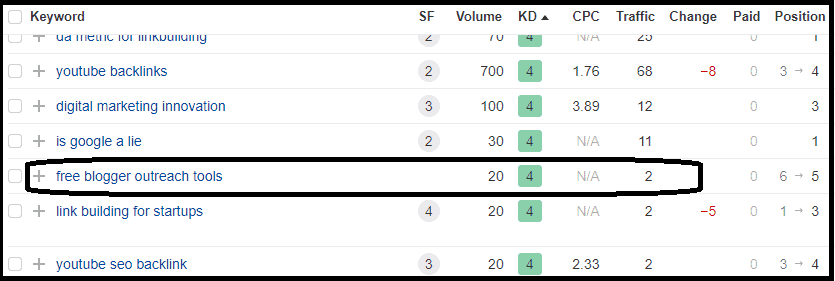
Pretty straightforward, right?
2. Online Assets Creation
Once you have a good keyword to target, create valuable content around it.
Don’t limit yourself to publishing only articles.
More formats mean more potential links and shares:
- Blog posts: the most popular and shared format to provide value to your audience (organic traffic)
- Infographics: visual tools that make complex data easier to understand and shareable (social media traffic)
- Videos: engaging and easy-to-digest content (video marketing traffic)
- Tools: useful instruments accessible for free or on a paid basis (referral traffic).
In short, diversify your online assets to be linked naturally from different sources, including social media and other bloggers’ websites.
Now, do you want to know a secret?
Creating valuable content simply means satisfying the user intent.Click To TweetGoogle updated its Search Central with the documentation on how to create people-first content:
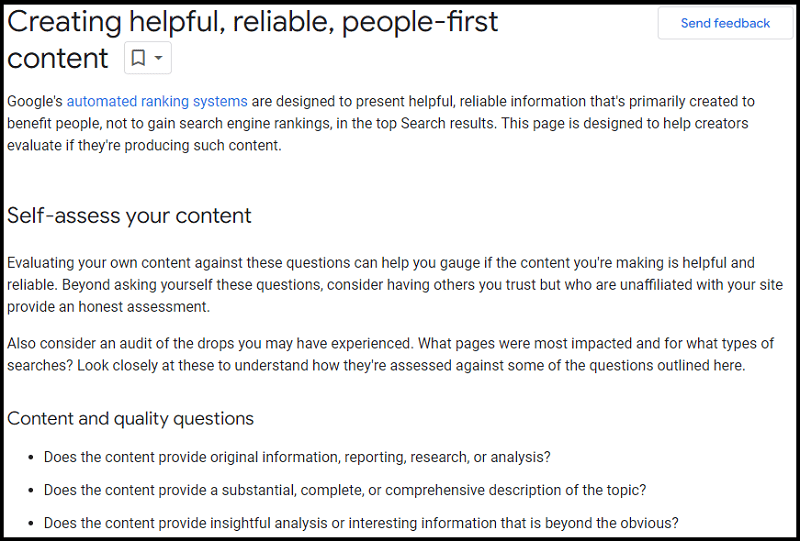
So, what you want to do is create original content (from your point of view and based on your experience and expertise).
Fully cover the topic and remember to :
- Include Your Keyword in the Title
- Include Your Keyword in the URL
- Optimize Your Title Tag
- Use Your Keyword In The First 100 Words
- Write an Optimized Meta Description
- Use Your Keyword in Sub-Headings
- Optimize Your Images
- Do Internal Linking
3. Structured Data
Structured data is an advanced way to organize and markup your content.
You need to add a few lines of code to your HTML (use schema.org), in order to make search engines better understand the page structure and contents.
Or, it’s even easier if you use WordPress (SEO plugins do that for you. I use Yoast).
Also, you can check with Google Search Console the valid items on your site:
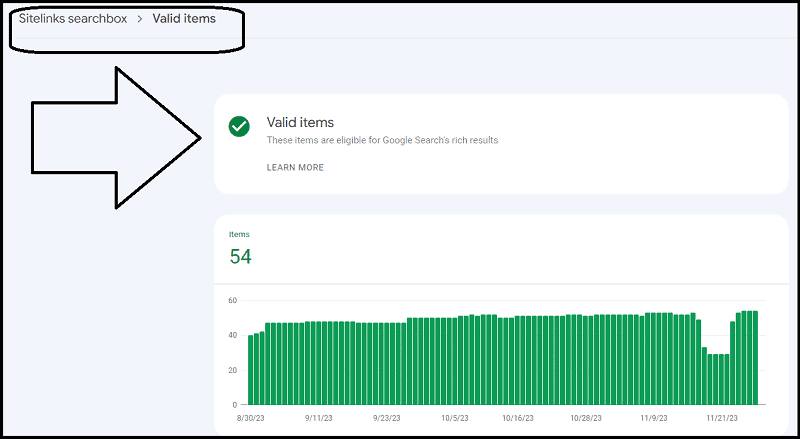
But what does structured data have to do with earning links?
This advanced technique enables elements such as ratings, reviews, events, people, and product schema markup.
With the result of increasing the visual appeal of your web page on search results (and organic CTR).
With that, you are more likely to attract users to click on your listings and get traffic (and likely get more links if they like your content).
Structured data can also improve your website’s overall online performance by providing more context to search engines about the content on your page.
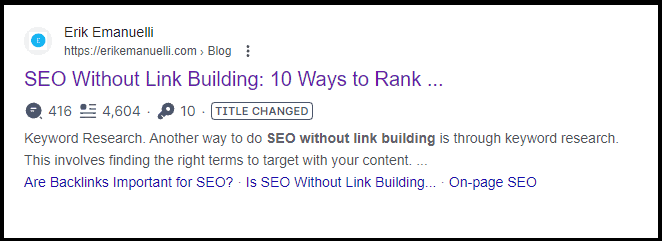
In addition, structured data allows for more accurate indexing of your pages, making it easier for search engines to understand the purpose and relevance of each page.
This means that when users search for terms related to your content, they are more likely to see your pages in the search results.
4. Content Promotion
So, now that you have published your content, how do you get noticed by people and earn those coveted editorial links?
The answer is simple: promote your content.
One way to do this is through social media channels. Share your content on platforms like X (the former Twitter), Facebook, LinkedIn, Instagram, Pinterest, and any other channels that are relevant to your industry or target audience.
Another way is to reach out to influencers in your niche and ask them to share your content with their followers. This can be done by mentioning them on social media or through email outreach (you can use any of these templates):
Subject: Hi [Blogger Name], You Just Missed This!
Hi [Blogger Name],
[Your Name] here, of [Your Blog Name].
I would like to thank you for your [Page Title] list:
[Insert URL]
I really love what you are saying [Insert Excerpt].
I thought you might be interested in including [Your Content] in the resource.
[Here Add Something About The Value of Your Content].
I can’t wait to hear back from you.
Best,
[Your Name]
Additionally, you can share your views and best copy to online communities, such as Reddit or Quora, where it may gain traction and be shared by others.
The key is to showcase your content in front of as many people as possible, increasing the chances of it being seen and mentioned by others.
And in case you are wondering, these are my favorite, unusual ways to promote content:
- Convert Content to Twitter Threads
- Get Included in Niche Newsletters
- Create Original Media
- Add Social Share Buttons
- Target Low-Competition Keywords With Traffic Potential
- Optimize for Google Discover
- Leverage Internal Linking
- Use Online Communities
- Repurpose Your Content
- Parasite SEO
Earned Links FAQs
Q: Is there a difference between earned natural links and natural outbound links?
A: Yes, there is a difference. Earned natural links are those that you receive organically from other websites without any solicitation or exchange. These can be gained through creating high-quality, valuable content that people find useful and want to link to.
On the other hand, natural outbound links are those that you include in your own content as references or citations to other sources. These can also be seen as a form of earned links, as they show that you have done your research and are providing valuable information to your readers.
Q: What is the difference between editorial links and manual links?
A: Editorial links are those that are given by websites without any solicitation or exchange, similar to earned natural links. These links are typically given by reputable and high-quality websites, making them more valuable in terms of SEO.
Manual links, on the other hand, are those that are obtained through outreach or payment. These may include guest post links, sponsored content links, or directory listings. While these links can still provide value to your website, they may not hold as much weight in the eyes of search engines as editorial links.
Q: How do I know if a link is earned or paid?
A: In most cases, it can be difficult to tell if a link is truly earned or not. However, there are some signs that may indicate if a link has been paid for, such as the use of exact match anchor text and placement in sponsored content.
Q: How do I measure the success of my earned links?
A: The success of your earned links can be measured through various metrics, such as website traffic, referral traffic, and search engine rankings. You can also use tools like Google Analytics or Ahrefs to track the number of backlinks to your website and the quality of those links (Ahrefs recently introduced the “best links” feature, that marks all the quality links).

Before You Go
Earning a lot of natural links is the dream of any content creator and site owner.
Hopefully, this guide is going to help you get more of these golden backlinks.
And to learn how to create content that people will love, don’t miss to read these guides:
Now, it’s over to you.
How many earned links have you got recently?
Please share your views in the comments below, thanks!


Hello, Erik,
You have shared some helpful insights here to earn natural backlinks. I have also earned some natural backlinks from high-authority websites like Smallbiztrends. You need to create high-quality content for this. Blogger outreach is also helpful in gaining natural backlinks.
Regards,
Vishwajeet Kumar
Hi Vishwajeet,
good to hear you earned some good, natural mentions.
And you’re right, it’s all based on creating high-quality content.
But, also about researching what your audience could be interested for (keyword research), and building a page that satisfies their needs.
My opinion: technically, blogger outreach is a way to build links, not gaining natural links. 🧐
Hello Erik, you’ve said it all. I’m excited you differentiated between link building and link earning. This is one of the thought leadership post I have read about link earning.
Most authors only focus on link buiding copies without dissecting link earning. Congratulations
I appreciate the positive feedback, Foster.
It was an immense satisfaction earning natural mentions and links from authoritative sites like Moz or Ahrefs, thanks to the content I created with a lot of effort.
Hello Erik,
Google always appreciates organic backlinks for search engine ranking…Your post is very helpful to earn it naturally. Thanks for sharing this valuable info with us.